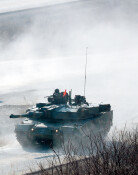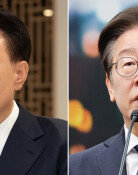It is difficult to move forward without reconciliation
It is difficult to move forward without reconciliation
Posted May. 08, 2023 08:12,
Updated May. 08, 2023 08:12
Japanese Prime Minister Fumio Kishida paid a visit to Korea on Sunday and had a summit meeting with President Yoon Suk Yeol. He made his visit to Korea 52 days after President Yoon's visit to Japan in March, which resumed shuttle diplomacy between the two countries for the first time in 12 years. During the summit, President Yoon stressed the importance of moving forward with cooperation and said, “We must break free from the belief that we cannot make progress in our cooperation unless we completely resolve our past issues.” Kishida reaffirmed his commitment to inherit the historical awareness of previous Japanese cabinets, including the 1998 Kim Dae-jung-Obuchi Declaration.
He did not directly reference “reflection and apology” regarding past history just as he did during Yoon’s visit to Japan in March. It is disappointing in the sense that it was reminiscent of the 1998 Korea-Japan Joint Statement. Even reiterating the Japanese government's perception of history from 10 years ago, which expressed “severe remorse and apology from the heart,” is not enough to bridge the gap in perception between Korea and Japan.
There are numerous urgent pending issues between Korea and Japan that cannot be held back by historical conflicts. The threat of North Korean nuclear and missile attacks requires close security cooperation, and with the restructuring of supply chains, economic and technological cooperation has become more critical than ever. Kishida's visit to Korea was originally scheduled for June or July after the G7 summit, but it was brought forward to address the pressing need for joint action between Korea and Japan, as well as among Korea, the U.S., and Japan in response to the New Cold War's global spread.
The recent progress in Korea-Japan relations can be attributed to the building of trust between the leaders of both nations. Prior to his visit to Korea, Kishida said, “I decided to make this return visit with the heart of repaying President Yoon's bold decisions and actions.” Notably, the issue of past history was not included on the official agenda for the summit. Instead, the leaders focused on future cooperation, demonstrating their understanding that the conflict over the past has been resolved.
But the history of Korea-Japan relations has shown that it is challenging to move past the cycle of stitching and conflict without addressing the root causes of the past conflicts. A fundamental reconciliation of the past among the two peoples, not just temporary trust between leaders, is pivotal to establishing a long-lasting relationship that can withstand fluctuations in public sentiment or changes in government. It is a difficult road, but it is crucial to pursue this path to ensure that the relationship between Korea and Japan is built on a common understanding of history and Japan’s new historical perception.
Headline News
- Internal rebellion investigation transferred to Public Prosecutor's Office
- Gov’t to approve Yongin Semiconductor National Industrial Complex
- US conservatives rally around Trump’s third term
- Lee Hyo-song named youngest Rookie of the Year in JLPGA history
- Controversy escalates over the appointment of Constitutional Court justices







